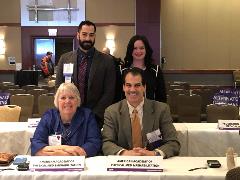 On June 8-12, 2019, AAPM&R delegates participated in the Annual Meeting for the American Medical Association (AMA) House of Delegates (HOD). The AAPM&R delegation was represented by Drs. Susan Hubbell (AMA Delegate and PM&R Section Council Chair), Stuart Glassman (AMA Delegate), Carlo Milani (Young Physician Section Representative, Alternate Delegate), and Julie Witkowski (Resident and Fellow Section Representative, Alternate Delegate).
On June 8-12, 2019, AAPM&R delegates participated in the Annual Meeting for the American Medical Association (AMA) House of Delegates (HOD). The AAPM&R delegation was represented by Drs. Susan Hubbell (AMA Delegate and PM&R Section Council Chair), Stuart Glassman (AMA Delegate), Carlo Milani (Young Physician Section Representative, Alternate Delegate), and Julie Witkowski (Resident and Fellow Section Representative, Alternate Delegate).
During this meeting, Dr. Stuart Glassman was elected to serve as a Member-At-Large on the Specialty and Service Society Caucus (SSS) Governing Council. The SSS is the largest caucus in the AMA HOD, representing over 120 national medical specialties and professional interest medical associations. AAPM&R congratulates Dr. Glassman for being elected to serve in this prestigious role and for his continued dedication to organized medicine.
Your Delegates in collaboration with Physiatrist in Training (PHiT) Board President, Dr. Justin Bishop, submitted the resolution, Physician Involvement in State Regulations of Motor Vehicle Operation and/or Firearm Use by Individuals with Cognitive Deficits Due to Traumatic Brain Injury. This resolution requested that AMA reaffirm current AMA policy, stating it supports stricter enforcement of current federal and state gun legislation and requested that AMA advocate for physician-led committees in each state to give further recommendations to the state regarding driving and/or gun use by individuals who are cognitively impaired and/or a danger to themselves or others.
The Reference Committee received mixed testimony on this resolution with numerous calls for the AMA to complete a study on the issue and propose recommendations for actions to take. The Reference Committee felt that a study on this issue would be beneficial to offer guidance to physicians. The report is likely to be provided at the 2020 Annual Meeting next June.
Your Delegates previously supported an important resolution, that your Academy actively advocates for, regarding the Reclassification of Complex Rehabilitation Technology. At the June meeting, your delegates offered amended language to strengthen the requests of AMA. The HOD ultimately approved the language that AMA will support the reclassification of complex rehabilitation technology (CRT) as a separate, distinct, and adequately funded payment category to improve access to the most appropriate and necessary equipment to allow individuals with significant disabilities and chronic medical conditions to increase their independence, reduce their overall health care expenses and appropriately manage their medical needs. AMA will also support state medical association and national medical specialty society efforts to accomplish adequately funded reclassification of CRT. Lastly, AMA will support, upon reclassification of CRT as a distinct category, the development by the Centers for Medicare & Medicaid Services, with the advice of physicians with appropriate training and expertise, of appropriate, simplified and streamlined requirements specific to CRT that reduce the administrative burden on physicians.
Your Delegates strongly advocated in support of two resolutions advocating for physicians with disabilities. The new AMA policy, Advocacy for Physicians with Disabilities (revised title), provides that AMA will study and report back on eliminating stigmatization and enhancing inclusion of physicians with disabilities; AMA will identify medical, professional and social rehabilitation, education, vocational training and rehabilitation, aid, counseling, placement services and other services which will enable physicians with disabilities to develop their capabilities and skills to the maximum and will hasten the processes of their social and professional integration or reintegration; and AMA will support physicians and physicians-in-training education programs about legal rights related to accommodation and freedom from discrimination for physicians, patients, and employees with disabilities. The new AMA policy, A Study to Evaluate Barriers to Medical Education for Trainees with Disabilities, provides that AMA will with relevant stakeholders to study available data on medical trainees with disabilities and consider revision of technical standards for medical education programs. It also provides that AMA will work with relevant stakeholders to study available data on medical graduates with disabilities and challenges to employment after training.
Your Delegates also weighed in on many additional timely topics including the use of autonomous vehicles for individuals with disabilities, health care reform (Medicare for All), raising Medicare rates for physicians, prior authorization reform, maintenance of certification, scope of practice (truth in advertising and protecting the term “physician”), telemedicine and augmented intelligence, pain management, opioid prescribing, compounding, and pharmacy benefit managers and pharmaceutical drug pricing.
Please check back on the AMA House of Delegates page of the AAPM&R website to view the full meeting report, once posted.